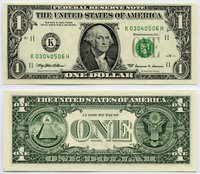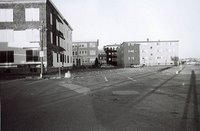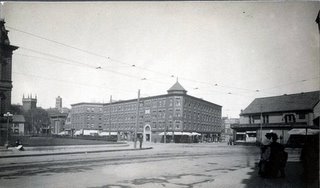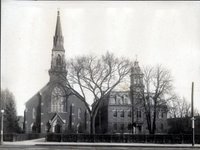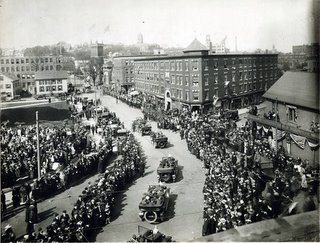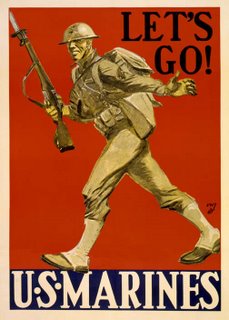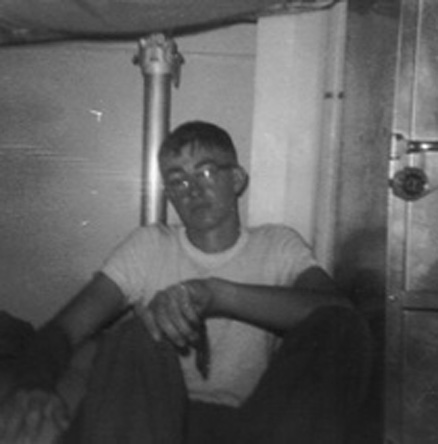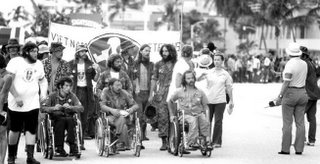
Thirty-eight years ago, on Jan. 20, 1968, I was shot and paralyzed from my mid-chest down during my second tour of duty in Vietnam. It is a date that I can never forget, a day that was to change my life forever.
Each year as the anniversary of my wounding in the war approached I would become extremely restless, experiencing terrible bouts of insomnia, depression, anxiety attacks and horrifying nightmares. I dreaded that day and what it represented, always fearing that the terrible trauma of my wounding might repeat itself all over again. It was a difficult day for me for decades and it remained that way until the anxieties and nightmares finally began to subside.
As I now contemplate another January 20th I cannot help but think of the young men and women who have been wounded in the war in Iraq. They have been coming home now for almost three years, flooding Walter Reed, Bethesda, Brooke Army Medical Center and veterans hospitals all across the country. Paraplegics, amputees, burn victims, the blinded and maimed, shocked and stunned, brain-damaged and psychologically stressed, over 16,000 of them, a whole new generation of severely maimed is returning from Iraq, young men and women who were not even born when I came home wounded to the Bronx veterans hospital in 1968.
I, like most other Americans, have occasionally seen them on TV or at the local veterans hospital, but for the most part they remain hidden, like the flag-draped caskets of our dead, returned to Dover Air Force Base in the darkness of night as this administration continues to pursue a policy of censorship, tightly controlling the images coming out of that war and rarely ever allowing the human cost of its policy to be seen.
Mosul, Fallouja, Basra, Baghdad, a roadside bomb, an RPG, an ambush, the bullets cracking all around them, the reality that they are in a war, that they have suddenly been hit. No more John Wayne-Audie Murphy movie fantasies. No more false bravado, stirring words of patriotism, romantic notions of war or what it might really mean to be in combat, to sacrifice for one's country. All that means nothing now. The reality has struck, the awful, shocking and frightening truth of what it really means to be hit by a bullet, an RPG, an improvised explosive device, shrapnel, a booby trap, friendly fire. They are now in a life-and-death situation and they have suddenly come face to face with the foreign policy of their own nation. The initial shock is wearing off; the painful reality is beginning to sink in, clearly something terrible has happened, something awful and inexplicable.
All the conditioning, all the discipline, shouting, screaming, bullying and threatening verbal abuse of their boot camp drill instructors have now disappeared in this one instant, in this one damaging blow. All they want to do now is stay alive, keep breathing, somehow get out of this place anyway they can. People are dying all around them, someone has been shot and killed right next to them and behind them but all they can really think of at this moment is staying alive.
You don't think of God, or praying, or even your mother or your father. There is no time for that. Your heart is pounding. Blood is seeping out. You will always go back to that day, that moment you got hit, the day you nearly died yet somehow survived. It will be a day you will never forget--when you were trapped in that open area and could not move, when bullets were cracking all around you, when the first Marine tried to save you and was shot dead at your feet and the second, a black Marine--whom you would never see again and who would be killed later that afternoon--would carry you back under heavy fire.
You are now with other wounded all around you heading to a place where there will be help. There are people in pain and great distress, shocked and stunned, frightened beyond anything you can imagine. You are afraid to close your eyes. To close your eyes now means that you may die and never wake up. You toss and turn, your heart pounding, racked with insomnia ... and for many this will go on for months, years after they return home.
They are being put on a helicopter, with the wounded all around them. They try to stay calm. Some are amazed that they are still alive. You just have to keep trying to stay awake, make it to the next stage, keep moving toward the rear, toward another aid station, a corpsman, a doctor a nurse someone who can help you, someone who will operate and keep you alive so you can make it home, home to your backyard and your neighbors and your mother and father. To where it all began, to where it was once peaceful and safe. They just try to keep breathing because they have got to get back.
They are in the intensive-care ward now, the place where they will be operated on, and where in Vietnam a Catholic priest gave me the Last Rites. Someone is putting a mask over their faces just as they put one over mine in Da Nang in 1968. There is the swirl of darkness and soon they awaken to screams all around them. The dead and dying are everywhere. There are things here you can never forget, images and sounds and smells that you will never see on TV or read about in the newspapers. The black pilot dying next to me as the corpsman and nurse tried furiously to save him, pounding on his chest with their fists as they laughed and joked trying to keep from going insane. The Green Beret who died of spinal meningitis, the tiny Vietnamese nun handing out apples and rosary beads to the wounded, the dead being carted in and out like clockwork,19- and 20-year-olds.
There is the long flight home packed with the wounded all around you, every conceivable and horrifying wound you could imagine. Even the unconscious and brain-dead whose minds have been blown apart by bullets and shrapnel make that ride with you, because we are all going home now, back to our country. And this is only the beginning.
The frustrations, anger and rage, insomnia, nightmares, anxiety attacks, terrible restlessness and desperate need to keep moving will come later, but for now we are so thankful to have just made it out of that place, so grateful to be alive even with these grievous wounds.
I cannot help but wonder what it will be like for the young men and women wounded in Iraq. What will their homecoming be like? I feel close to them. Though many years separate us we are brothers and sisters. We have all been to the same place. For us in 1968 it was the Bronx veterans hospital paraplegic ward, overcrowded, understaffed, rats on the ward, a flood of memories and images, I can never forget; urine bags overflowing onto the floor. It seemed more like a slum than a hospital. Paralyzed men lying in their own excrement, pushing call buttons for aides who never came, wondering how our government could spend so much money (billions of dollars) on the most lethal, technologically advanced weaponry to kill and maim human beings but not be able to take care of its own wounded when they came home.
Will it be the same for them? Will they have to return to these same unspeakable conditions? Has any of it changed? I have heard that our government has already attempted to cut back millions in much needed funds for veterans hospitals--and this when thousands of wounded soldiers are returning from Iraq. Will they too be left abandoned and forgotten by a president and administration whose patriotic rhetoric does not match the needs of our wounded troops now returning? Do the American people, the president, the politicians, senators and congressmen who sent us to this war have any idea what it really means to lose an arm or a leg, to be paralyzed, to begin to cope with the psychological wounds of that war? Do they have any concept of the long-term effects of these injuries, how the struggles of the wounded are only now just beginning? How many will die young and never live out their lives because of all the stress and myriad of problems that come with sending young men and women into combat?
It is so difficult at first. You return home and both physically and emotionally don't know how you are going to live with this wound, but you just keep trying, just keep waking up to this frightening reality every morning. "My God, what has happened to me?" But you somehow get up, you somehow go on and find a way to move through each day. Even though it is impossible, you go on. Maybe there will be a day years from now, if you are lucky to live that long, when it will get better and you will not feel so overwhelmed. You must have something to hope for, some way to believe it will not always be this way. This is exactly what many of them are going through right now.
They are alone in their rooms all over this country, right now. Just as I was alone in my room in Massapequa. I know they're there--just as I was. This is the part you never see. The part that is never reported in the news. The part that the president and vice president never mention. This is the agonizing part, the lonely part, when you have to awake to the wound each morning and suddenly realize what you've lost, what is gone forever. They're out there and they have mothers and fathers, sisters and brothers, husbands and wives and children. And they're not saying much right now. Just like me they're just trying to get through each day. Trying to be brave and not cry. They still are extremely grateful to be alive, but slowly, agonizingly they are beginning to think about what has really happened to them.
What will it be like for them when one morning they suddenly find themselves naked sitting before that mirror in their room and must come face to face with their injury? I want to reach out to them. I want them to know that I've been there too. I want to just sit with them in their room and tell them that they must not give up. They must try to be patient, try to just get through each day, each morning, each afternoon any way they can. That no matter how impossible and frustrating it may seem, how painful, regardless of the anxiety attacks and nightmares and thoughts of suicide, they must not quit. Somewhere out there there will be a turning point, somewhere through this all they will find a reason to keep on living.
In the months and years that are to follow, others will be less fortunate. Young men and women who survived the battlefield, the intensive-care ward, veterans hospitals and initial homecoming will be unable to make the difficult and often agonizing adjustment.
Is this what is awaiting all of them? Is this the nightmare no one ever told them about, the part no one now wants to talk about or has the time to deal with? The car accidents, and drinking and drug overdoses, the depression, anger and rage, spousal abuse, bedsores and breakdowns, prison, homelessness, sleeping under the piers and bridges. The ones who never leave the hospital, the ones who can't hold a job, can't keep a relationship together, can't love or feel any emotions anymore, the brutal insomnia that leaves you exhausted and practically unable to function, the frightening anxiety attacks that come upon you when you least expect them, and always the dread that each day may be your last.
Marty, Billy, Bobby, Max, Tom, Washington, Pat, Joe? I knew them all. It's a long list. It's amazing that you're still alive when so many others you knew are dead, and at such a young age. Isn't all this dying supposed to happen when you're much older? Not now, not while we're so young. How come the recruiters never mentioned these things? This was never in the slick pamphlets they showed us! This should be a time of innocence, a time of joy and happiness, no cares and youthful dreams--not all these friends dying so young, all this grief and numbness, emptiness and feelings of being so lost.
The physical and psychological battles from the war in Iraq will rage on for decades, deeply impacting the lives of citizens in both our countries.
As this the 38th anniversary of my wounding in Vietnam approaches, in many ways I feel my injury in that war has been a blessing in disguise. I have been given the opportunity to move through that dark night of the soul to a new shore, to gain an understanding, a knowledge, an entirely different vision. I now believe that I have suffered for a reason and in many ways I have found that reason in my commitment to peace and nonviolence. We who have witnessed the obscenity of war and experienced its horror and terrible consequences have an obligation to rise above our pain and suffering and turn the tragedy of our lives into a triumph. I have come to believe that there is nothing in the lives of human beings more terrifying than war and nothing more important than for those of us who have experienced it to share its awful truth.
We must break this cycle of violence and begin to move in a different direction; war is not the answer, violence is not the solution. A more peaceful world is possible.
I am the living death
The memorial day on wheels
I am your yankee doodle dandy
Your John Wayne come home
Your Fourth of July firecracker
Exploding in the grave
From The Huffingtom Post
http://www.huffingtonpost.com/ron-kovic/the-forgotten-wounded-of-_b_14056.html
I met Ron Kovic in LA and in Boston. He was the premiere speaker for the Vietnam Veterans Against the War (VVAW). I attended two VVAW rallies in LA and the I was the only person to show for a booksigning of "Born on the Fourth of July", at a bookstore at the Prudential Center in Boston.
I'm going to comment on his article bit by bit.



